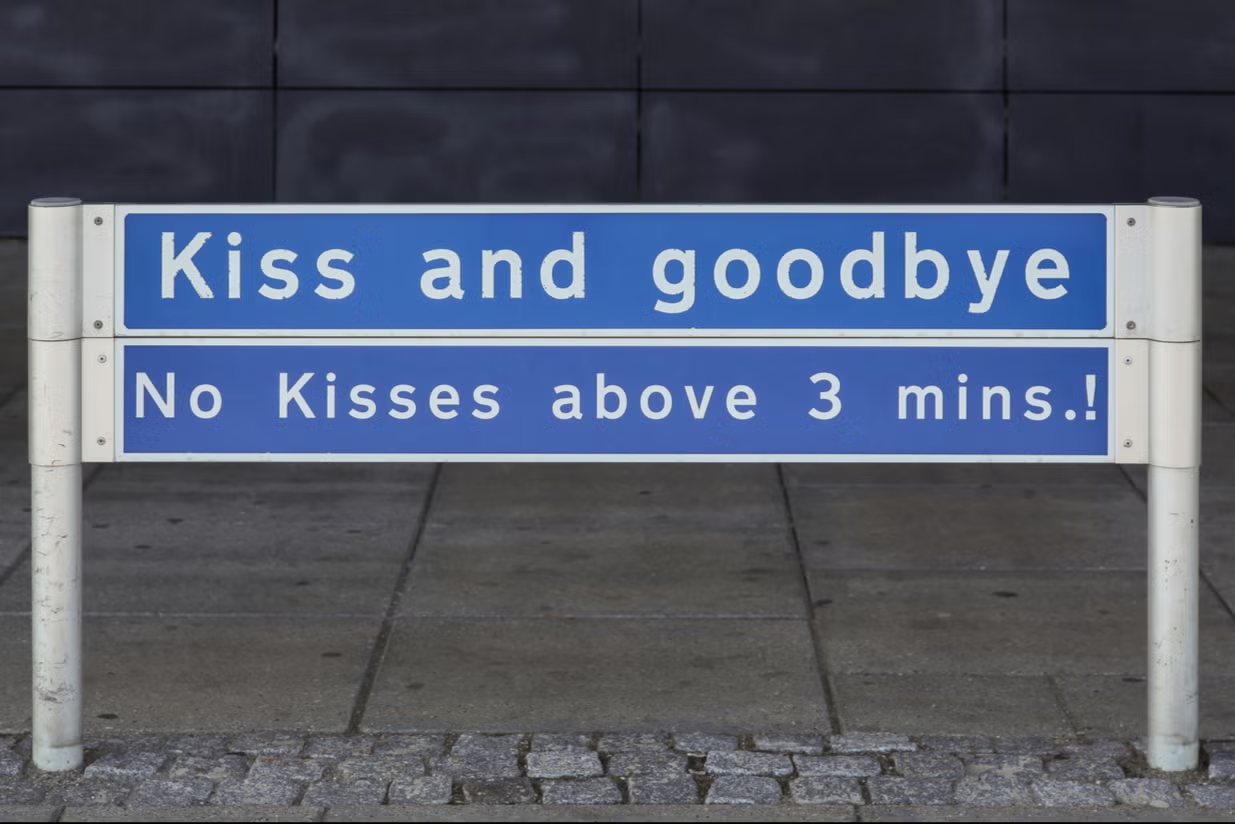Your support helps us to tell the story
Support NowThis election is still a dead heat, according to most polls. In a fight with such wafer-thin margins, we need reporters on the ground talking to the people Trump and Harris are courting. Your support allows us to keep sending journalists to the story.
The Independent is trusted by 27 million Americans from across the entire political spectrum every month. Unlike many other quality news outlets, we choose not to lock you out of our reporting and analysis with paywalls. But quality journalism must still be paid for.
Help us keep bring these critical stories to light. Your support makes all the difference.
Want to hug your loved ones goodbye before they board their flight to a far-flung destination? You might need to set a timer. The countdown is certainly on for travellers at Dunedin airport in New Zealand, where a new sign has been introduced to cap “hug time” at the departures drop-off zone. The longest you can have? A perfunctory three minutes. “For fonder farewells please use the car park,” the sign advises.
There are some practical reasons behind this grim directive. “There’s only so much space we have in that drop-off area and too many people are spending too much time on their fonder farewells [there],” the airport’s CEO Daniel De Bono explained during an interview with Radio New Zealand, in which he also emphasised that longer goodbyes should be consigned to the main car park – and even cited some research suggesting that just 20 seconds of hugging is sufficient to give you an oxytocin and serotonin boost.
That may well be true, and Dunedin is not the only place to put a time limit on public displays of affection: on the other side of the world in Aalborg, Denmark, you will find a famous sign guiding airport users to “kiss and goodbye” – but also specifying “no kisses above three minutes”. Yet for all that these instructions might be dressed up in slightly twee language, isn’t there something a bit depressing about the impulse to curtail closeness during a moment that can be an emotional rollercoaster? Have we really got to a point where we prioritise good traffic flow and efficiency over the opportunity to give the people we’re closest to a proper pre-travel send-off?
I’m not about to channel the spirit of prime minister Hugh Grant in Love Actually and start claiming that airports are a hotbed of love and human kindness, an instant tonic to any existential malaise. Life is, for better or worse, nothing like a Richard Curtis movie (and PM HG was famously talking about the arrivals gate during his monologue, which I’m sure you’ll end up watching on ITV2 at least three times in the months before the end of 2024, whether you like it or not).

But our impulse to hold our loved ones close before they embark on a long journey, or a new chapter of their life, is a deeply human one – and it’s something we should, well, embrace, rather than try to cut down to an optimal time frame. Airport goodbyes can be some of our saddest or most anxiety-inducing times. Forgive us for not being able to condense all our feelings into a snappy routine. One disgruntled social media user put it well when they wrote, under a photo of the sign on Facebook: “You can’t put a time limit on hugs! That’s inhumane.”
Of course, an extended goodbye full of cinematic flourishes probably isn’t required if you’re about to spend a couple of hours on a Jet2 flight soundtracked by the complete discography of Jess Glynne, before your week-long holiday in the Balearics. And I’d be the first to start rolling my eyes at the weeping couple who are about to be parted for a couple of painful days while one embarks on a stag or hen do. But think of the people whose families are living abroad, and can only afford the longhaul journey once every year or less. Think of the grandparents who are missing out on far-away grandchildren growing up, and who want to eke out every possible second with them.
Goodbyes are messy and hard to predict: sometimes what was meant to be a wave and a quick peck on the cheek can turn into something much more emotional
You could argue that these are farewells that would be better done elsewhere (in that longer-stay car park that the Dunedin airport CEO is so keen to signpost, for example). But goodbyes are messy and hard to predict: sometimes what was meant to be a wave and a quick peck on the cheek can turn into something much more emotional. Imagine rushing someone through their romcom-worthy declaration of love, or telling your mum to wrap up her tearful speech because you’ve only got 42 seconds left of allotted farewell time.
And wouldn’t this actually be a difficult rule to enforce? Are airports going to start employing teams of people to loiter by the express drop-off clutching stopwatches, ready to wrench passengers from their family and friends once they’ve overshot the three-minute mark? Perhaps they’re planning to rely upon travellers to passive-aggressively police one another by loudly sighing and tapping their watches. Some have already gone for a more straightforward (read: profitable) approach by charging ever-increasing fees to use the drop-off: earlier this year a study from the RAC found that more than a third of major airports had raised so-called “kiss and fly” prices in the past year.
We spend so much of our lives rushing from one thing to the next, attempting to cram in more, optimising everything for maximum speed and productivity. It seems like we’ve started to collectively value efficiency over proper connection. Policing our airport goodbyes to prioritise this is just the latest example. Yes, you might momentarily get a bit annoyed by a traffic jam while you’re heading into arrivals, but wouldn’t knowing that someone has been able to bid a proper adieu to their favourite people help to soften the blow? If not, you might have a heart of stone – that, or you’re unhealthily fixated on getting to duty free.
Disclaimer: The copyright of this article belongs to the original author. Reposting this article is solely for the purpose of information dissemination and does not constitute any investment advice. If there is any infringement, please contact us immediately. We will make corrections or deletions as necessary. Thank you.



